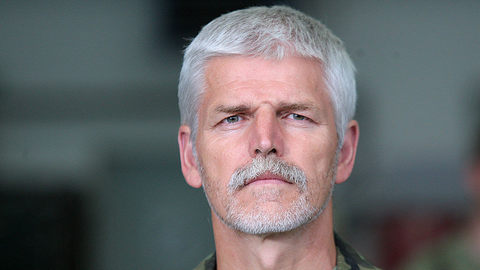Czech general Petr Pavel, who will take up the post of the NATO Military Committee head in June, said at a Prague conference on security affairs today, Corruption.info reports citing Ceske Noviny.
Pavel warned that NATO´s political representation is incapable of reacting to a changed situation fast enough.
He said the measures Europe has taken in face of the threats of Russia and Islamic State are "embarrassingly ineffective."
"On the one hand, one of [NATO´s] disadvantages is its complex process of decision making. It is because NATO has 28 members who have to reach consensus on all conclusions," Pavel said.
On the other hand, Russia is capable of making a decision very quickly, within a few hours, he said.
The length of NATO´s approval procedures on both the national and alliance levels far exceeds the deadlines within which its rapid reaction forces are capable of deployment, Pavel said.
The rapid reaction forces are able to intervene within two days, he said, adding that the political process must be put in harmony with the military forces´ deployment deadlines.
Russia would be able to occupy the Baltics within two days, during which NATO would be incapable of reacting to the situation. NATO would face the question of whether to start war, perhaps nuclear, against Russia over the occupied Baltics, Pavel said.
"From the technical point of view, if I consider how many forces Russia is able to deploy in the Baltics, the size of the Baltic countries and the density of forces on their territories, the Baltics could really be occupied in a couple of days," he said.
"A different question is how effective the deterrence element, represented by NATO´s Article 5 and its nuclear component, would be in relation to Russia," Pavel said.
He also criticised shortcomings in NATO´s sharing of intelligence information and the absence of NATO´s own intelligence network.
Pavel´s view was opposed by Jiri Sedivy, Czech ambassador to NATO, who said NATO´s intelligence system is of a high quality.
Sedivy said Russia would probably be able to occupy Kyiv, for example, within two days. However, the question is whether it would have a sufficient logistic support afterwards, he said.
Former Czech chief-of-staff Jiri Sedivy, whose name is identical with the above ambassador´s, said Russia could not win a war with NATO and it is aware of this.
Nevertheless, Russia could try to destabilise society, Sedivy said, pointing out the demonstrable Russian propaganda that accompanied the previous Czech debate on whether to enable the installation of a U.S. missile defence radar near Prague, and the recent crossing of the Czech Republic by a U.S. military convoy.
Sedivy said he would welcome it if the state had an instrument to control the information environment
.








